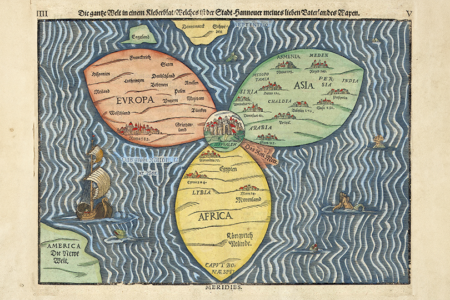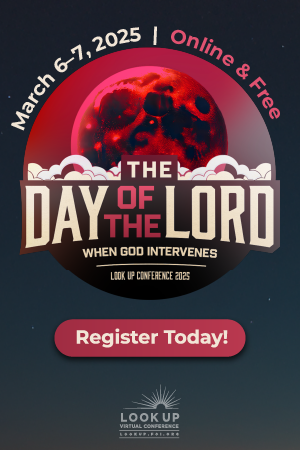The ‘Locusts’ Are Coming!
A look at the future Day of the Lord in Joel 1—3
When God wants to get a nation’s attention, He often allows natural disasters. Floods, earthquakes, tornadoes, or hurricanes can strike an area, resulting in masses of humanity being slaughtered or made refugees, buildings being leveled, and land stripped of its life.
God commissioned the prophet Joel to predict such a major disaster for Judah: a plague of locusts that would invade the land, destroy Judah’s crops and stored grain, and strip the area of all plant life. It would be a catastrophe.
Moses had warned the Israelites that judgment would come in the form of locusts if they forsook God: “You shall carry much seed out to the field but gather little in, for the locust shall consume it” (Dt. 28:38).
He also instructed them to speak of God’s great works to their children (4:9; 6:6–7), so they would (1) remember God’s goodness and mercy to them in times of their disobedience and (2) recognize God’s severe judgments on Israel because of their disobedience (Lev. 26:14–33; Dt. 28:15–68).
The locust invasion was a judgment from God, which the book of Joel identifies as the “day of the LORD [Jehovah]” (1:15). The phrase Day of the Lord should not be interpreted as a 24-hour period but, rather, as an extended time when God personally becomes involved in world affairs.
The Day of the Lord is mentioned 19 times by eight different Old Testament writers and five times by three New Testament writers. The prophet Joel used the phrase five times (Joel 1:15; 2:1, 11, 31; 3:14)—more often than any other writer in the Bible.
The locust plague foreshadows greater judgments to come on Israel. It also points to events that involve many nations in the last days, especially those mentioned in the book of Revelation.
Joel’s use of the phrase Day of the Lord refers to three specific times:
1. The Assyrian and Babylonian invasions of Israel.
2. The future Great Tribulation, when God judges the Gentile nations.
3. Jesus Christ’s future return to judge the earth at His Second Coming.
Judgments on Israel
The book of Joel (835 BC) calls on Judah’s people and priests to lament, humble themselves before God, and cry out in repentance because of the vast destruction a locust plague had wreaked on their land.
The plague was so catastrophic it endangered the survival of both man and beast. The only thing Israel could do was pray in repentance for God’s forgiveness, mercy, and deliverance.
The locusts also symbolize two armies that would invade the land and bring judgment:
Assyrians. First came the Assyrians, who uprooted the 10 tribes of the northern kingdom of Israel in 722 BC, carrying the leaders into captivity (2 Ki. 17). The Assyrians imported Gentiles who married the poorer Israelites left in the land, thereby corrupting the religious system that became a mixture of Jews and pagans.
From that day forward, the 10 tribes (northern kingdom) ceased to exist as a separate entity in Israel. Many people there fled to the southern kingdom of Judah when they saw the invasion coming. Thus, all the tribes that constituted the nation of Israel had residents in Judah.
Babylonians. Second was the collapse of the southern kingdom in 586 BC. That event left Jerusalem and Solomon’s Temple in ruins (chap. 25). Those who survived the Babylonian destruction were hauled to Babylon for the 70-year captivity prophesied by the prophet Jeremiah (Jer. 25:11).
Joel asked, “For the day of the LORD is great and very terrible; who can endure it?” (Joel 2:11). The answer is only those who have experienced the mercy and lovingkindness of the Lord.
Judgments in the Tribulation
The Bible also prophesies of further attacks on Israel from the Gentile nations. One involves Gog’s army, made up of various nations confederated together with the motive to destroy Israel, acquire the nation’s wealth (Ezek. 38:12–13), and seize the nation’s strategic location (Dt. 32:8; Ezek. 5:5). (See Israel My Glory, July/August 2024.)
God will supernaturally destroy this confederacy without Israel lifting a finger to defend itself (Ezek. 38:18–23).
After the destruction of Gog and company, Satan, through the Antichrist, will control the world. He will break a covenant he made with Israel to protect the nation, turn against the Jewish people, and pursue the same objective as Gog: to destroy Israel, occupy its land, and confiscate Israel’s wealth (Dan. 9:27).
In an attempt to annihilate Israel (Rev. 12:13–17), the Antichrist will kill two-thirds of the Jewish population during a future time known as the Great Tribulation (Zech. 13:8; Mt. 24:21). (More than 50% of the world population will die.) All who refuse to worship the Antichrist and his image will be killed by the Antichrist’s right-hand man, known as the False Prophet (Rev. 13:15).
Many Jewish people will perish during the Antichrist’s invasion of Jerusalem (Zech. 14:1–3). But a Jewish remnant of one-third will be spared, redeemed, and restored to their land (13:9).
Joel chapter 3 ushers readers into God’s courtroom to witness His judgment on the ungodly nations controlled by the Antichrist. In the last three and a half years of the future seven-year Tribulation, God will pour out His seal judgments (Rev. 6), trumpet judgments (chaps. 8—9), and bowl judgments (chap. 16) on this “son of perdition” (2 Th. 2:3) and his kingdom (Rev. 6—16). Although Joel did not use the term Armageddon, he predicted it, along with God’s intervention (Joel 3:9–17).
Judgment at Christ’s Coming
Christ’s Second Coming is a major doctrine in the Bible. With a sweep of the pen, Joel transports readers to the time of the Messiah’s return to Earth and judgment of the ungodly.
How will the nations react to the Lord’s appearing? Will they bow in humble repentance at His presence? No! “The kings of the earth set themselves, and the rulers take counsel together, against the LORD, and against His Anointed [Messiah]” (Ps. 2:2).
In Revelation 19:11–21, Christ is pictured as ready to do battle and destroy all the opposition to Himself and Israel at His Second Coming. He is pictured as seated on a white horse, ready to depart from heaven as a Warrior-King. He is clothed in battle array, coming “in righteousness” as “He judges and makes war” (v. 11).
Jesus is called “Faithful” (v. 11), meaning trustworthy, and “True” (v. 11), meaning genuine, compared to all that is false. “His eyes were like a flame of fire” (v. 12), indicating a gaze of intelligence, righteousness, and divine wrath on the wicked. And “His name is called The Word of God” (v. 13), meaning He is the eternal Word.
He will be “clothed with a robe dipped in blood” (v. 13), from the blood of His enemies. Written on His robe and thigh are the words “KING OF KINGS AND LORD OF LORDS” (v. 16).
His weapon will be fierce: “Now out of His mouth goes a sharp sword, that with it He should strike the nations. And He Himself will rule them with a rod of iron. He Himself treads the winepress of the fierceness and wrath of Almighty God” (v. 15). The sword symbolizes Christ’s Word, which will consume the Antichrist and his army (2 Th. 2:8). Jesus will win the battle with the power of His Word.
The enemy’s army will be destroyed like grapes crushed in a winepress (cf. Joel 3:13–14). The imagery is of the small berries being trampled underfoot until all the juice is squeezed out to make wine. But here blood, not grape juice, spurts from the winepress of God’s wrath. The carnage will be so great that the blood of God’s enemies will rise to the height of the horses’ bridles for 200 miles (Rev. 14:20). Christ will rescue Israel and then rule the nations with a “rod of iron” (12:5; 19:15), meaning with total authority.
An angel will call for the “birds” (vultures) to consume the flesh of the dead. Seeing vultures eat the decaying carcasses of millions of people within a 200-mile radius of Jerusalem will be a terrifying spectacle beyond imagination (19:17–21).
Yet, God promises to redeem a righteous remnant in Israel. That remnant will survive the Tribulation’s refining furnace. As silver and gold are purified by fire, so will the Great Tribulation purge away all of Israel’s iniquity. The repentant will emerge free of sin, with hearts that truly love Jehovah.
With its suffering finally over, Israel will be established in its own land to enjoy all of the blessings God promises in the New Covenant (Ezek. 36:25–38). What a wonderful day awaits Israel when the Messiah brings a redeemed and cleansed remnant to complete salvation. Then the Lord will dwell in Israel with His people forever (Joel 3:18–21, cf. Lk. 1:31–33).
Photo: Adobe Stock









AMEN! Come Lord Jesus!